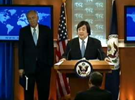
For an institution under pressure to prove it is delivering justice, the appearance at the International Criminal Court today of two Darfur rebel leaders wanted for war crimes was a welcome development. Conveniently, news of this latest case comes just days after the close of a major conference focused on reaffirming commitments to the ICC. Details and reactions from the Kampala conference are gradually trickling out, and the U.S. delegation for one seemed entirely content with the outcome.
Briefing reporters at the State Department this week, U.S. Ambassador-At-Large for War Crimes Issues Stephen Rapp said, “our principled engagement was so positive,” particularly during the initial days of ‘stock-taking,’ during which the delegations reviewed the first eight years of the court’s operations.
Among the newsworthy developments in Kampala was an agreement by state parties on a definition for the crime of aggression, which U.N. Secretary General Ban Ki-moon called “historic.” But in light of the contentiousness of discussions over how the ICC would go about prosecuting the crime of aggression, state parties compromised by postponing a final decision for another seven years.
At the press briefing, State Department legal advisor Harold Koh, who led the U.S. delegation to Kampala along with Rapp, said that the United States found the definition agreed to by the member states “flawed,” but he said safeguards put in place protect the “vital interests” of the United States. Rapp and Koh appeared confident that in another seven years, the United States will, at the least, be able to opt out of any conditions that might make Americans vulnerable to “politically motivated prosecutions.” Furthermore, Rapp said that the ICC has been “appropriately focused” during its initial eight years of operation, taking on cases that “cried out for justice.” In any case, dealing with the crime of aggression will now be an issue for another administration.
Koh and Rapp waved off questions about what it would take for the United States to become a member of the ICC, but they signaled that the Obama administration believes it is important for U.S. strategic interests to stay fully involved in the young court, with its 111 members and counting.
It’s a marked shift for a country that gained a notorious reputation as an ICC detractor during the era of President Bush’s U.N. Ambassador, John Bolton, and only began cooperating with the court in the final years of Bush’s time in office.
As Koh summarized:
“After 12 years, I think we have reset the default on the U.S. relationship with the court from hostility to positive engagement. In this case, principled engagement worked to protect our interest, to improve the outcome, and to bring us renewed international goodwill. As one delegate put it to me, the U.S. was once again seen, with respect to the ICC, as part of the solution and not the problem."
How times have changed.
Photo: Harold Koh and Stephen Rapp brief reporters about the U.S. reaction to the Kampala conference. (State Department)

